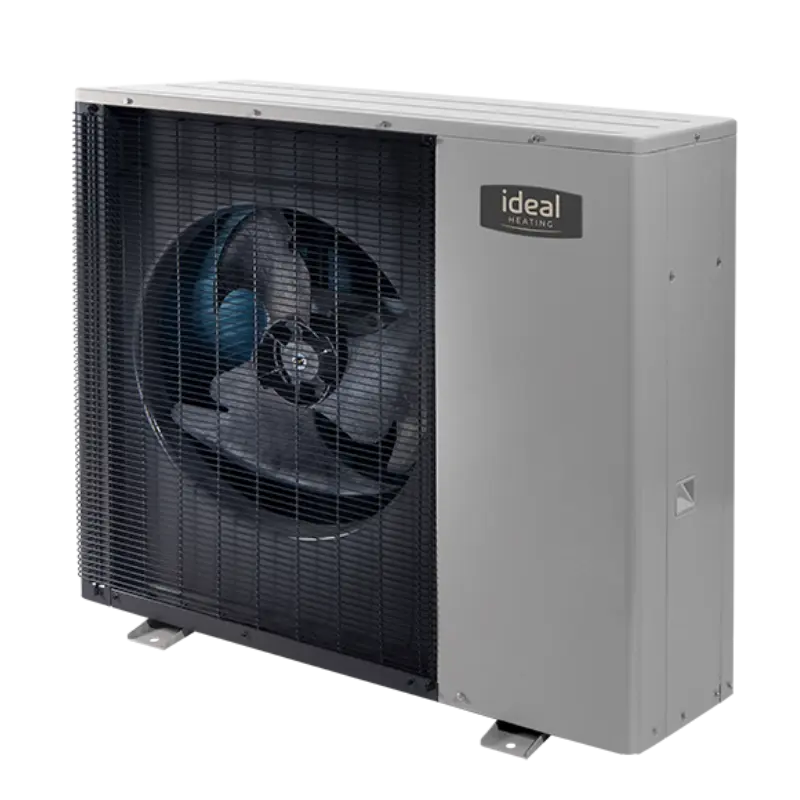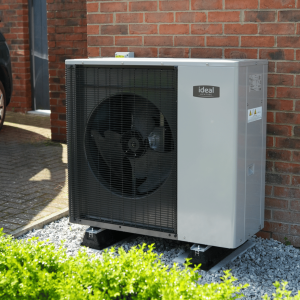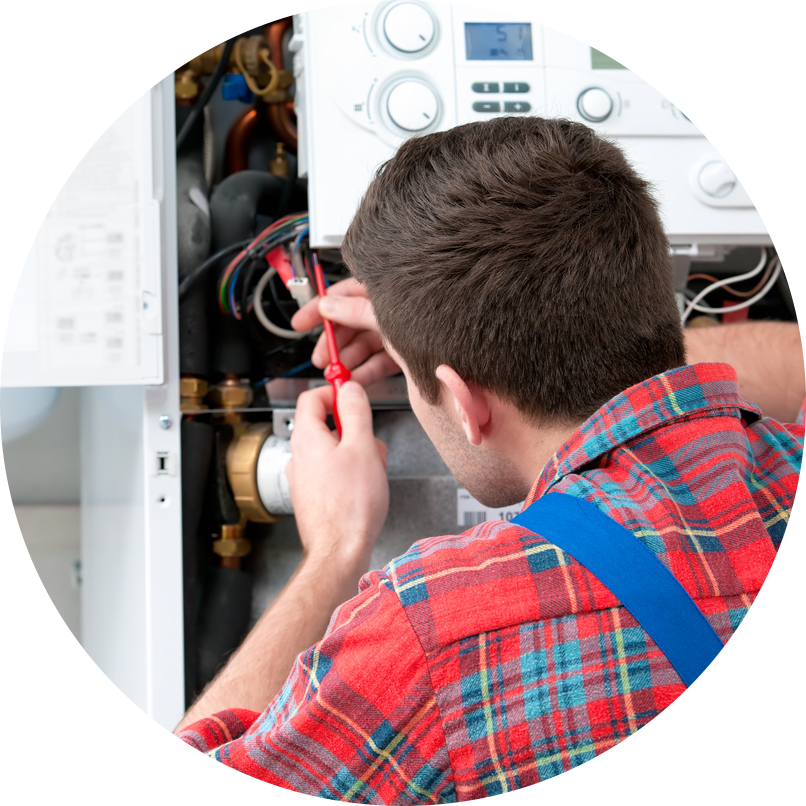Air Source Heat Pumps
Everything You Need to Know
Air source heat pumps are a sustainable, efficient heating solution.
Here’s everything you need to know written by our heat pump experts.
Speak to an expert – Get a quote
Heat pumps keep you warm, not the planet.
Fossil fuels are being phased out across all elements of the energy market. Gas boilers face looming bans. As a result heat pumps remain one of the most efficient ways of heating your home sustainably.
You may have questions about what they are and how they work. You’ll also want to know how much they cost to install and run. To make it super easy, we’ve covered it all in this ultimate guide.
- What is an air source heat pump?
- How do air source heat pumps work?
- Will a heat pump heat my hot water?
- Different types of heat pump
- Will I need to upgrade my radiators?
- Gas boiler vs heat pump

What is an air source heat pump?
Air source heat pumps (ASHP’s) are an innovative, renewable energy system that will heat your home and your hot water. They use energy from the air outside your home even in the depths of winter.
Air Source Heat Pump systems are highly energy efficient compared to traditional gas boilers. They could even save you money on your energy bills. They are quiet, easy to use, and don’t need much maintenance once installed.
Finally, they are environmentally friendly and do not rely on fossil fuels. This means they help contribute towards a sustainable future and the journey to Net Zero.

How do they work?
Air source heat pumps do not generate electricity, they just use it more efficiently. They work by absorbing energy from the air outside and converting it to heat your home even in temperatures below freezing.
Energy is never created or lost, it’s simply moved. When you heat your home using something like a wood burner or gas/oil boiler, you’re relying on the energy stored in those materials for the heat. Your heat pump has a finite source of energy – it works like this:
- Refrigerant Circulation: Refrigerant circulates through an evaporator.
- Air Intake: A fan draws outside air over the evaporator, absorbing energy.
- Vaporisation: Absorbed energy causes the refrigerant to vaporise.
- Compression: Vapourised refrigerant is compressed, generating heat.
- Heat Exchange: Hot vapour passes through a condenser, transferring heat to your home’s water-based heating system, heating your hot water and radiators.
- Cooling and Expansion: Refrigerant, still under pressure; is cooled and then expanded, restarting the cycle.

Will an air source heat pump heat my hot water?
Yes!
Your new air source heat pump will heat your water to the right temperature just as well as your previous heating system. You will need to have a water tank as part of the system and this will be taken into account in your system design.
Different types of heat pumps
There are three main types of heat pumps. They extract heat from air, water, and ground and each has their own pros and cons.
The different methodseach one uses make them suited to different evironments and scenarios. For the UK climate and the majority of UK properties, air source heat pumps are the most effective option.
Ground Source Heat Pumps
Ground source heat pumps work by burying a pipe in the ground. This is either through a number of really deep boreholes (sometimes up to 150m deep!) or through a “slinky” pipe. This is then coiled around a relatively shallow ditch which is then in-filled. These pipes draw heat from the soil in which they are buried.
This type of heat pump is generally more expensive to install and run.
Water Source Heat Pumps
Rather than running a pipe loop through soil, water source heat pumps drill down into an aquifer to access underground water sources (though sometimes, a nearby river or water source is used).
The method of extracting energy is the same: run a water/antifreeze mixture through the pipe loop, warm it up from the water source, extract that heat through a heat exchanger.
Air Source Heat Pumps
Air source heat pumps, at first glance, feel like they shouldn’t be as effective and consistent as ground or water source pumps but they’re the most reliable, and cost-effective solutions (in certain climates).
A loop filled with refrigerant is snaked around the back of the heat pump unit like a car radiator; this is the “evaporator”. A fan pulls air over the evaporator loop so the refrigerant can extract the air’s energy and turn the liquid refrigerant into a vapour.

Will I need to upgrade my radiators?
Not always, no.
Air-to-water heat pumps replace a boiler in order to provide heat for hot water and central heating. They’re really efficient but operate at a slightly lower maximum output compared to fuel-burning systems. You may need to upgrade to bigger radiators for maximum efficiency but we’ll look at this as part of your technical assessment.
That said, this is only essential if your radiators are old-fashioned single-panel models. Most radiators installed in UK homes in the last 20-30 years will work perfectly well with an air source heat pump. The only drawback of an air source heat pump installation with old radiators is that system efficiency will be reduced. So it doesn’t have to be all or nothing. You can get a heat pump installed and then opt to upgrade your radiators a few years down the line!
If we feel that your system would benefit from upgraded radiators, we’ll let you know, but it certainly doesn’t stop you from making the jump to clean energy.
Gas boiler vs heat pump:
which is best?
In the UK, we are really attached to our gas boilers. They’re fast and powerful, but they also have to use a lot of fuel to operate. What’s more, the fact that they have to use a fuel limits their efficiency: they can only ever be 100% efficient.
All fuel-burning heaters lose energy in some form or another, so usually operate between 60-95% efficiency. This, in turn, means that between 5-40% of fuel used for heating is wasted and so is your hard-earned money!
Boilers don’t just waste money through inefficiency. Burning these fuels is creating serious problems with emissions leading to accelerating climate change around the world. Experts estimate that the world has around 50 years left of oil and gas at the current rate of consumption so change is needed now.
Fuel-based boilers also need consistent access to that fuel. This means you either need to have a mains connection or are forced to install bulky, hazardous fuel (like an LPG or oil tank) somewhere near your home.
Heat pumps, on the other hand, draw heat from the outside air and, crucially, can be powered entirely by solar photovoltaic electricity or from 100% green grid-energy tariffs. This means you can get dependable, sustainable energy all year round!
You can read more about heat pumps and how they work here.

How loud is an air source heat pump?
We go into heat pump noise here in more detail but essentially, heat pumps aren’t loud for two reasons:
- Modern designs have dramatically minimised noise.
- You’re rarely standing next to the unit.
The heat pump units we choose for our installations are all chosen with noise output as a key factor – the quieter the better. Most models have a “Standard Sound Mode” during day-to-day, normal operation, which makes the outdoor unit incredibly quiet.
At three metres, the sound pressure is often around 38 dBA. This is about the same as the sound of leaves swaying in the wind or the gentle hush of a library. The Ideal units we supply hold the UK Quiet Mark certification for being among the quietest available.
So, air source heat pumps are remarkably quiet, but sound pressure also becomes exponentially weaker with distance, The sound of an ASHP doesn’t get through walls or windows. Even in commercial applications where suppressing noise is crucial (such as heating recording and media studios), the noise of the outside unit isn’t a consideration. What’s more, water-based heating systems are certainly quieter than systems inside a property because there aren’t any fans running to blow air around the building.
How much does an air source heat pump cost?
As with many significant investments in your home, the cost of installing an air source heat pump isn’t as simple as adding and subtracting. It’s not easy, to give a specific set of numbers as each system is bespoke to the property that it is intended for.
Cost considerations include:
- The size of the property and the number of occupants
- Usage requirements and preferences
- Insulation and heat loss of a property
- The energy tariff you are on
We will design a system specifically for your home, your family, and your specific usage requirements. What’s more, we offer a free consultation and quote right from the start. This gives you complete transparency about what’s involved in your heat pump journey.

Spread the cost with monthy payments
A 0% finance package means you could spread the cost of your air source heat pump installation with manageable monthly payments. Below is an illustrative example of what your typical repayments could look like over two years.
| 2 Year Plan | |
| Cash price | £13,000 |
| Government grant (BUS) | – £7,500 |
| Balance | £5,500 |
| Deposit (15%) | £825 |
| Credit amount | £4,675 |
| Interest | n/a |
| Total amount payable (inc deposit) | £5,500.00 |
| Number of repayments | 24 |
| APR | 0% |
| Monthly payment amount | £194.79 |
If you live in Scotland, you can apply for an interest-free loan of up to £7,500 through Home Energy Scotland.
Heat pump questions
What is a heat pump?
Air source heat pumps are highly efficient, renewable energy systems. They heat your home and hot water using energy from the air outside even in the depths of winter. Quiet and easy to use, they don’t need much maintenance once installed and could save you money on your energy bills.
If you want the finer details about heat pumps work, read on.
Are heat pumps noisy?
Like any machine, heat pumps make some noise. However, you might be surprised by how quiet they are. Most heat pumps generate sound that is same as the gentle hush of a library or the sound of breeze through the leaves of a tree.
If you'd like to see just how quiet heat pumps are, read on.
Are heat pumps efficient?
Air source heat pumps are one of the most efficient heating systems for your home. They can generate up to three times the amount of heat for every kw of energy used. This makes them highly efficient compared to your traditional boiler. Heat pumps are sustainable and could also help you save energy.
Want more information? Click here.
How much will a heat pump cost?
To provide you with an accurate quote, we’ll discuss several factors that could influence the cost of your new heat pump installation. This includes, but is not limited to:
- The size of your house
- Your current heating and hot water system
- Your usage requirements
- The heat loss in your house
- Your current radiators
- What grants you may be entitled to
- Any finance options available to you
Getting all this information before giving you a final quote helps us provide the most accurate price. This way, you won’t have any unexpected surprises.
What's included in my quote?
You quote from us will include full costs for the following:
- Installation and set up by one of our expert installers
- Technical assessment and system design
- Your £7.5k Boiler Upgrade Scheme grant (We will apply for this for you on your behalf if you are eligible)
- Heat pump, water cylinder and controls
- Your supplier specific waranty details
- Plumbing and electrical supplies required for your installation
- Any radiator upgrades you’ve been quoted for
- Your EPC and MCS registration certificates
- 2 year warranty on all other parts
- Dedicated support team, from quote to post install.
All our installations are completed in line with MCS standards.
What's not included in my quote?
We are unable to provide you with quotes for the following:
- Site preparation and groundworks – If required, you will need to arrange this prior to installation
- Planning permission – if your heat pump requires planning permission, you will need to apply for this from the local authority
- Scaffolding – If your installation requires scaffolding, you will need to arrange a contractor to provide this
- Fuse or service upgrades – We will talk to your Distribution Network Operator (DNO) to see if any upgrades are required. You will need to authorise any upgrades before they can be carried out.
- Underfloor heating – We do not provide underfloor heating as part of your heat pump installation. You will need to arrange a separate contractor for this.
How do I get the £7.5k heat pump grant?
If you are eligible for the Boiler Upgrade Scheme, we will apply for this for you.
You can find the BUS scheme eligibility criteria here. We take care of all the paperwork and applications. You won’t have to worry about it!
Will a heat pump lower my energy bills?
There are a number of ways you could save money on your energy bills with an air source heat pump.
You could unlock £351 in savings with EDF Energy’s Heat Pump & Save Tracker and benefit from no standing charge for a year and twice-daily discounts.
To take advantage of this tariff, you will need to contact our colleagues at EDF directly here
You should also consider the following:
- Installing solar panels and batteries on your property
- Ensuring your property has any extra insulation
You could save up to £290 a year on your energy bills by replacing an old G-rated gas boiler. If you replace a new A-rated gas boiler, your energy bills may stay about the same.
Source: The Energy savings Trust: Potential annual savings of installing a standard air source heat pump in a three bedroom semi-bedroom detached home in Great Britain, with radiator upgrades as needed. https://energysavingtrust.org.uk/advice/air-source-heat-pumps/#:~:text=England%2C%20Scotland%20and%20Wales
Do I need to replace my radiators?
Not always, no.
However, if you do not replace unsuitable radiators, your heat pump may not work as efficiently as possible. Heat pumps operate at a lower flow temperature to traditional gas boilers. This is one of the reasons they are so highly efficient. To maximise efficiency, heat pumps require radiators with as large a surface area as possible.
For a full guide to the best radiators for heat pumps, click here.
How much room does a heat pump need?
You will need space outside your home for the external unit as well as inside space for a hot water cylinder. Our expert team will design the best system for you and your home.
I’m planning a renovation or extension; can I still get a heat pump?
Yes!
Our team can work from plans to design your heat pump system. Get in touch today and we will talk you through the process.
Will a heat pump keep me warm in winter?
Your air source heat pump is great for the UK climate.
It will keep you warm even when outside temperatures drop to -28°C. It may work a little harder but you will still be warm and cosy in your home.
Our heat pump installations are backed up by our Heat Pump Promise. So, if your heat pump doesn't work as promised, we'll give you a refund.


